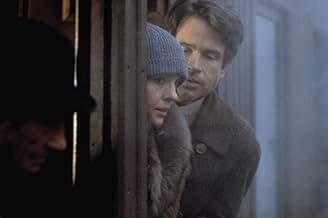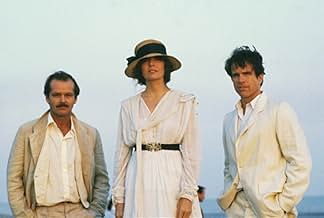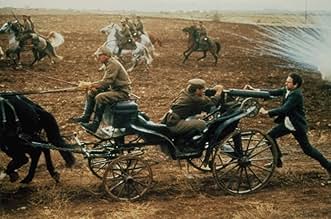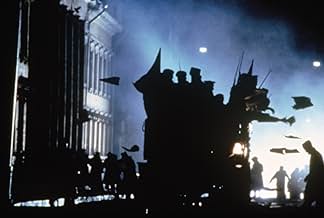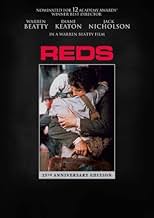A radical American journalist becomes involved with the Communist revolution in Russia, and hopes to bring its spirit and idealism to the United States.A radical American journalist becomes involved with the Communist revolution in Russia, and hopes to bring its spirit and idealism to the United States.A radical American journalist becomes involved with the Communist revolution in Russia, and hopes to bring its spirit and idealism to the United States.
- Director
- Writers
- Stars
- Won 3 Oscars
- 22 wins & 37 nominations total
Eleanor Wilson
- Mrs. Reed
- (as Eleanor D. Wilson)
- Director
- Writers
- All cast & crew
- Production, box office & more at IMDbPro
Featured reviews
An engrossing film about John Reed's love affair with Louise Bryant and his struggles in the midst of the Russian Revolution. There are great performances from Beatty, Keaton, Nicholson (excellent as Eugene O'Neill) and Stapelton in her Oscar winning performance as Emma Goldman. Beatty's precision and timing in the use of his camera in this picture is a superb achievement. There is a touch of David Lean in director Beatty in this film. The color, the editing, the sound. All of those important filmic elements are at play here in great form. Beatty won the Best Director Oscar, but lost the Best Picture award to Chariots of Fire.
"Reds" is a 200-minute epic masterpiece which deals with left-wing American journalist John Reed (Warren Beatty in an Oscar-nominated performance) and his coverage of the Russian Revolution of the 1910s. Beatty's passion is what carries this ambitious film, which could have easily been a multi-million dollar disaster. His Oscar-winning direction, screenplay, and overall performance carry the film as far as it can possibly go. The top-flight performances by Diane Keaton, Jack Nicholson (both Oscar-nominated), and Maureen Stapleton (Oscar-winning) all add great depth to the performance. Paul Sorvino, Edward Herrmann, and Gene Hackman also make lasting impressions in supporting roles. Overall a great achievement all the way around. 5 stars out of 5.
Warren Beatty's magnum opus Reds was presented as a revival film official selection of the New York Film Festival 2006 to celebrate the twenty-fifth anniversary of its original appearance.
Reds's greatest virtue may be that it's grand, without being pompous, film-making. It's a film that takes some pride in being big and turbulent and unruly. It's important, but it's not tidy. It's in part certainly very much about ideology, but it avoids sharp, well-honed edges or large hard-etched "points." John Reed (played by the film's impresario, its sole producer, director, co-author, and star, Warren Beatty) was a man who happened to be able to write a first-hand account of the Bolshevik revolution, a long-time bestseller called Ten Days That Shook the World. At that time early in the twentieth century in America Reed arguably was a central figure, if only in the sense that during his time in Greenwich Village he managed to be (as he wanted to be) consistently at the center of things American political and cultural when he wasn't in Russia (which was pretty central then too). Roger Ebert thinks the movie "never succeeds in convincing us that the feuds between the American socialist parties were much more than personality conflict and ego-bruisings" (that may depend on how hard we need to be convinced to begin with), but we do care about Reds (Ebert thinks) as "a traditional Hollywood romantic epic, a love story written on the canvas of history, as they used to say in the ads it is the thinking man's Doctor Zhivago, told from the other side, of course." What about the choice of Warren Beatty and Diane Keaton as the lovers? Initially that may seem an odd and chemistry-poor decision. (I'm not sure I overcome that impression.) But arguably the film takes long enough with each of its main characters to make them into rounded people, complex enough to be attractive to others and to each other. Beatty uses the romance to hold the story together, and in doing so, he follows a conventional enough scheme. Reds stands out from other American mainstream products and for all its maverick central force, it remains that in its attempt to deal seriously with complex socio-political events during a turbulent period, and to approach them in an open-minded way. Beatty weaves other significant characters into the fabric of his drama, notably the leftist activist Emma Goldman (Maureen Stapleton, who got the Oscar for Best Supporting Actress) and the radical editor Max Eastman (Edward Herrmann), who are members of the same political-intellectual salon into which he brings Louise, as is the playwright Eugene O'Neill (Jack Nicholson).
Beatty's filmic recreation of John Reed is good in not being too serious or too idealized: in having a silly side Beatty's Reed perhaps has something of himself. Reed's lover Louise Bryant (Keaton), though originally a bourgeois lady from Portland, is similarly rounded; she's led by her relationship to Reed to develop other facets and strengths, and further enlarged as a personality through the way the film depicts her long affair with the alcoholic O'Neill, played by a toned-down but emotionally potent Nicholson. His discontent and negative energy are disturbing. Personalities anchor the film; but in some of the political debates and adventures one loses track and forgets why Reed is somewhere in Russia. He is at the center of things. But why he is where he is otherwise at certain moments is uncertain. In its ambition to keep juggling the many balls of major personalities and major political currents and historical events, Reds loses some of its narrative clarity and momentum over time. Complex political and historical currents are tracked, but the emotional trajectory loses its momentum. Nonetheless the film develops sweep in its length of three and a quarter hours. One walks out convinced that the material was complex enough to be worthy of such length, even if Beatty and his co-writer Trevor Griffiths could not whip it all into shape.
Whether it's all worth it on the stage of international cinema or not, this is a film of historical interest as a great independent project, begun logically in the Seventies, but completed right in the middle of Hollywood by an American intelligent and engaged enough to be star, director, writer, and producer, to raise $35 million to do it, and to make more or less the movie he wanted to make right in the middle, so to speak, of a wave of conservatism and yuppiedom, in the early Eighties, when people were thinking about making money and making it, when Ronald Reagon was President of the United States. What more appropriate time to reexamine this achievement than in the middle of the second term of George Bush II? No doubt Beatty took on this story because he was interested in a time in America when it was rife with left-wing politics. But he is realistic, and he made a Hollywood movie, with big stars and romance. And that's what it is and remains. But one can't imagine anybody else making it, and that's what makes it worth revisiting. Warren Beatty is an admirable maverick in the clone-heavy world of Southern California media-moguldom. He's a real person. And this is his great performance as a person and as an artist. I first saw it with a group of real communists. "We're "reds," they said as we walked out. The theater staff looked impressed. I was bowled over by their pride. Not everyone watches this film as a "traditional Hollywood romantic epic." It would never have been made if that were all it was. Its grandeur and ambition are still moving and it must not be forgotten. For a more pungent treatment of a political and social theme starring Beatty, consider Hal Ashby's 1975 Shampoo.
Reds's greatest virtue may be that it's grand, without being pompous, film-making. It's a film that takes some pride in being big and turbulent and unruly. It's important, but it's not tidy. It's in part certainly very much about ideology, but it avoids sharp, well-honed edges or large hard-etched "points." John Reed (played by the film's impresario, its sole producer, director, co-author, and star, Warren Beatty) was a man who happened to be able to write a first-hand account of the Bolshevik revolution, a long-time bestseller called Ten Days That Shook the World. At that time early in the twentieth century in America Reed arguably was a central figure, if only in the sense that during his time in Greenwich Village he managed to be (as he wanted to be) consistently at the center of things American political and cultural when he wasn't in Russia (which was pretty central then too). Roger Ebert thinks the movie "never succeeds in convincing us that the feuds between the American socialist parties were much more than personality conflict and ego-bruisings" (that may depend on how hard we need to be convinced to begin with), but we do care about Reds (Ebert thinks) as "a traditional Hollywood romantic epic, a love story written on the canvas of history, as they used to say in the ads it is the thinking man's Doctor Zhivago, told from the other side, of course." What about the choice of Warren Beatty and Diane Keaton as the lovers? Initially that may seem an odd and chemistry-poor decision. (I'm not sure I overcome that impression.) But arguably the film takes long enough with each of its main characters to make them into rounded people, complex enough to be attractive to others and to each other. Beatty uses the romance to hold the story together, and in doing so, he follows a conventional enough scheme. Reds stands out from other American mainstream products and for all its maverick central force, it remains that in its attempt to deal seriously with complex socio-political events during a turbulent period, and to approach them in an open-minded way. Beatty weaves other significant characters into the fabric of his drama, notably the leftist activist Emma Goldman (Maureen Stapleton, who got the Oscar for Best Supporting Actress) and the radical editor Max Eastman (Edward Herrmann), who are members of the same political-intellectual salon into which he brings Louise, as is the playwright Eugene O'Neill (Jack Nicholson).
Beatty's filmic recreation of John Reed is good in not being too serious or too idealized: in having a silly side Beatty's Reed perhaps has something of himself. Reed's lover Louise Bryant (Keaton), though originally a bourgeois lady from Portland, is similarly rounded; she's led by her relationship to Reed to develop other facets and strengths, and further enlarged as a personality through the way the film depicts her long affair with the alcoholic O'Neill, played by a toned-down but emotionally potent Nicholson. His discontent and negative energy are disturbing. Personalities anchor the film; but in some of the political debates and adventures one loses track and forgets why Reed is somewhere in Russia. He is at the center of things. But why he is where he is otherwise at certain moments is uncertain. In its ambition to keep juggling the many balls of major personalities and major political currents and historical events, Reds loses some of its narrative clarity and momentum over time. Complex political and historical currents are tracked, but the emotional trajectory loses its momentum. Nonetheless the film develops sweep in its length of three and a quarter hours. One walks out convinced that the material was complex enough to be worthy of such length, even if Beatty and his co-writer Trevor Griffiths could not whip it all into shape.
Whether it's all worth it on the stage of international cinema or not, this is a film of historical interest as a great independent project, begun logically in the Seventies, but completed right in the middle of Hollywood by an American intelligent and engaged enough to be star, director, writer, and producer, to raise $35 million to do it, and to make more or less the movie he wanted to make right in the middle, so to speak, of a wave of conservatism and yuppiedom, in the early Eighties, when people were thinking about making money and making it, when Ronald Reagon was President of the United States. What more appropriate time to reexamine this achievement than in the middle of the second term of George Bush II? No doubt Beatty took on this story because he was interested in a time in America when it was rife with left-wing politics. But he is realistic, and he made a Hollywood movie, with big stars and romance. And that's what it is and remains. But one can't imagine anybody else making it, and that's what makes it worth revisiting. Warren Beatty is an admirable maverick in the clone-heavy world of Southern California media-moguldom. He's a real person. And this is his great performance as a person and as an artist. I first saw it with a group of real communists. "We're "reds," they said as we walked out. The theater staff looked impressed. I was bowled over by their pride. Not everyone watches this film as a "traditional Hollywood romantic epic." It would never have been made if that were all it was. Its grandeur and ambition are still moving and it must not be forgotten. For a more pungent treatment of a political and social theme starring Beatty, consider Hal Ashby's 1975 Shampoo.
.
I am old enough to have lived through (probably) three different Americas. These are radically different worlds. It isn't just the mood, styles or state of the economy; its the adoption of a whole cosmology. Religions change under our feet. Family, love, belonging. These things are malleable yet largely beyond our control and we forget what "things were like." Memory always is constructed in terms of the present world.
Always.
So projects like this are necessary. We cannot know who we are unless we remind ourselves who we were.
The ordinary fold here is a romance, folded into grand political actions. Here they are a bit more cerebral than usual, but never getting past the notion of simple justice.
The more unusual and complex fold is that we see a story based on real events and people. Interspersed with that story are interviews of people who were personally involved in the story. These are remarkable, the way they are captured and the way they are edited to overlap with and annotate the story. But much more engaging is that these are enticing people, many with minds and phases that invite us into their faces made warmer and more open by Beatty's camera. I compare this to the "Up" serious and the contrast is astonishing. True, here we want to be informed about the lives of others, and the "Up" goals pretend that the people randomly selected decades ago are remotely worth knowing.
But these folks are. We want more, simply based on their implicit invitation, and we carry ourselves into the narrative more forcefully, sort of like the characters do. This is folding doing its job and doing it well. They remember. I remember, and therefore am.
Ted's Evaluation -- 3 of 3: Worth watching.
I am old enough to have lived through (probably) three different Americas. These are radically different worlds. It isn't just the mood, styles or state of the economy; its the adoption of a whole cosmology. Religions change under our feet. Family, love, belonging. These things are malleable yet largely beyond our control and we forget what "things were like." Memory always is constructed in terms of the present world.
Always.
So projects like this are necessary. We cannot know who we are unless we remind ourselves who we were.
The ordinary fold here is a romance, folded into grand political actions. Here they are a bit more cerebral than usual, but never getting past the notion of simple justice.
The more unusual and complex fold is that we see a story based on real events and people. Interspersed with that story are interviews of people who were personally involved in the story. These are remarkable, the way they are captured and the way they are edited to overlap with and annotate the story. But much more engaging is that these are enticing people, many with minds and phases that invite us into their faces made warmer and more open by Beatty's camera. I compare this to the "Up" serious and the contrast is astonishing. True, here we want to be informed about the lives of others, and the "Up" goals pretend that the people randomly selected decades ago are remotely worth knowing.
But these folks are. We want more, simply based on their implicit invitation, and we carry ourselves into the narrative more forcefully, sort of like the characters do. This is folding doing its job and doing it well. They remember. I remember, and therefore am.
Ted's Evaluation -- 3 of 3: Worth watching.
Bolshevik leader V.I. Lenin once wrote, "The capitalists will sell us the rope with which we will hang them."
Lenin's quote came to mind when I was watching one of the most spellbinding movies to come along in years,and not since David Lean's brilliant 1965 epic classic "Doctor Zhivago" hasn't been a movie in recent memory that has come close. That motion picture is "Reds",released in 1981 by Paramount Pictures. The film was Warren Beatty's peeve project which he served not only as it star,but also the co-writer and direction. Director Warren Beatty's epic love story about American writers John Reed and Louise Bryant,set amid of the turbulence of American politics in the 1910's World War I and the Russian revolution that set this movie into plain focus. The movie itself is astounding to behold and is a tragic love story between the writers John Reed(Warren Beatty),and Louise Bryant(Diane Keaton). But it creatively used artsy,radical Greenwich Village in the 1910's-and such as real-life characters as playwright Eugene O'Neill(Jack Nicholson),and anarchist activist Emma Goldman(Maureen Stapleton)-as well as the drama of the Russian Revolution and the subsequent civil war as the principal landscapes in which their relationship plays out.
Director Beatty also made creative use of on-camera "testimony" by the likes of novelists Henry Miller and Rebecca West,Republican politician Hamilton Fish,comic George Jessel and civil libertarian Roger Baldwin. These senior citizens recall,with varying degrees of historical accuracy,Reed,Bryant and the times in which they lived. "Reds" shows convincingly that many of the contemporary issues in politics and culture have their antecendents in the first debates of the 20th century. Debates over birth control and abortion,marriage and commitment,public life versus private life,revolution versus reform are given full expression from varying viewpoints throughout the lengthy film(which runs over three hours). To Beatty's credit,his film captures the excitement the Bolshevik revolution stirred,both inside and outside Russia while revealing how the Bolshevik leadership quickly began to suppressing dissent within the revolutionary ranks on the way to becoming a dictatorship with a country that is in constant turmoil. Beatty's efforts certainly paid off artistically,bringing him prestige to him and Paramount making "Reds" a huge box office success for the studio when it premiered in theatres around Christmas of 1981.
"Reds" became one of the top highest grossing pictures of that year,and it paid off in high standards too. "Reds",which received 12 Academy Award nominations including Best Picture,lost an upset to Hugh Hudson's "Chariots Of Fire" in the Best Picture category. However it won three Oscars for Best Director(Warren Beatty),Best Supporting Actress(Maureen Stapleton),and Best Cimematopgraphy(Vittorio Storaro). Eventually,"Reds" made more than $40 million at the domestic box office,and once international figures were added in,it became one of the top grossing films of the 1980's. A feat Warren Beatty is still proud of to this day.
Lenin's quote came to mind when I was watching one of the most spellbinding movies to come along in years,and not since David Lean's brilliant 1965 epic classic "Doctor Zhivago" hasn't been a movie in recent memory that has come close. That motion picture is "Reds",released in 1981 by Paramount Pictures. The film was Warren Beatty's peeve project which he served not only as it star,but also the co-writer and direction. Director Warren Beatty's epic love story about American writers John Reed and Louise Bryant,set amid of the turbulence of American politics in the 1910's World War I and the Russian revolution that set this movie into plain focus. The movie itself is astounding to behold and is a tragic love story between the writers John Reed(Warren Beatty),and Louise Bryant(Diane Keaton). But it creatively used artsy,radical Greenwich Village in the 1910's-and such as real-life characters as playwright Eugene O'Neill(Jack Nicholson),and anarchist activist Emma Goldman(Maureen Stapleton)-as well as the drama of the Russian Revolution and the subsequent civil war as the principal landscapes in which their relationship plays out.
Director Beatty also made creative use of on-camera "testimony" by the likes of novelists Henry Miller and Rebecca West,Republican politician Hamilton Fish,comic George Jessel and civil libertarian Roger Baldwin. These senior citizens recall,with varying degrees of historical accuracy,Reed,Bryant and the times in which they lived. "Reds" shows convincingly that many of the contemporary issues in politics and culture have their antecendents in the first debates of the 20th century. Debates over birth control and abortion,marriage and commitment,public life versus private life,revolution versus reform are given full expression from varying viewpoints throughout the lengthy film(which runs over three hours). To Beatty's credit,his film captures the excitement the Bolshevik revolution stirred,both inside and outside Russia while revealing how the Bolshevik leadership quickly began to suppressing dissent within the revolutionary ranks on the way to becoming a dictatorship with a country that is in constant turmoil. Beatty's efforts certainly paid off artistically,bringing him prestige to him and Paramount making "Reds" a huge box office success for the studio when it premiered in theatres around Christmas of 1981.
"Reds" became one of the top highest grossing pictures of that year,and it paid off in high standards too. "Reds",which received 12 Academy Award nominations including Best Picture,lost an upset to Hugh Hudson's "Chariots Of Fire" in the Best Picture category. However it won three Oscars for Best Director(Warren Beatty),Best Supporting Actress(Maureen Stapleton),and Best Cimematopgraphy(Vittorio Storaro). Eventually,"Reds" made more than $40 million at the domestic box office,and once international figures were added in,it became one of the top grossing films of the 1980's. A feat Warren Beatty is still proud of to this day.
Did you know
- TriviaReportedly, Warren Beatty reshot some scenes up to 35 times. Paul Sorvino said he did as many as 70 takes for one scene, and Maureen Stapleton said she did as many as 80 takes for another. Reportedly, of this, she famously once said to Warren Beatty, "Are you out of your fucking mind?" This earned her a round of applause from the crew.
- GoofsThe Finnish doctor tells Reed that his blood pressure is too high, but at that time, hypertension was not considered a problem by most doctors, who did not even consider treating it. Not until the mid-'40s did doctors begin to understand the dangers of high blood pressure.
- Quotes
Eugene O'Neill: If you were mine, I wouldn't share you with anybody or anything. It'd be just you and me. We'd be the center of it all. I know it would feel a lot more like love than being left alone with your work.
- Crazy creditsAs the credits roll, additional interviews with the 'witnesses' play.
- Alternate versionsThree seconds of horse falls were cut from the British version. The DVD supplements showing these shots are also cut in England.
- ConnectionsFeatured in Sneak Previews: Rollover, Quartet, My Dinner with Andre, Reds (1981)
- SoundtracksYou're a Grand Old Flag
Written by George M. Cohan
Details
- Release date
- Country of origin
- Languages
- Also known as
- Comrades
- Filming locations
- Senate Square, Helsinki, Finland(on location)
- Production companies
- See more company credits at IMDbPro
Box office
- Budget
- $32,000,000 (estimated)
- Gross US & Canada
- $40,382,659
- Opening weekend US & Canada
- $2,325,029
- Dec 6, 1981
- Gross worldwide
- $40,382,788
Contribute to this page
Suggest an edit or add missing content


